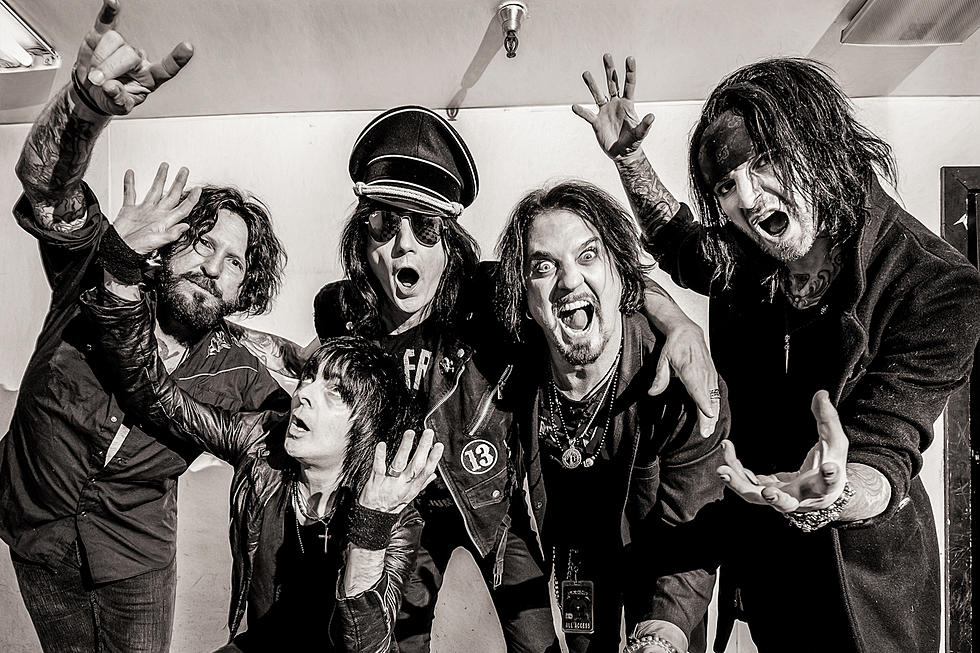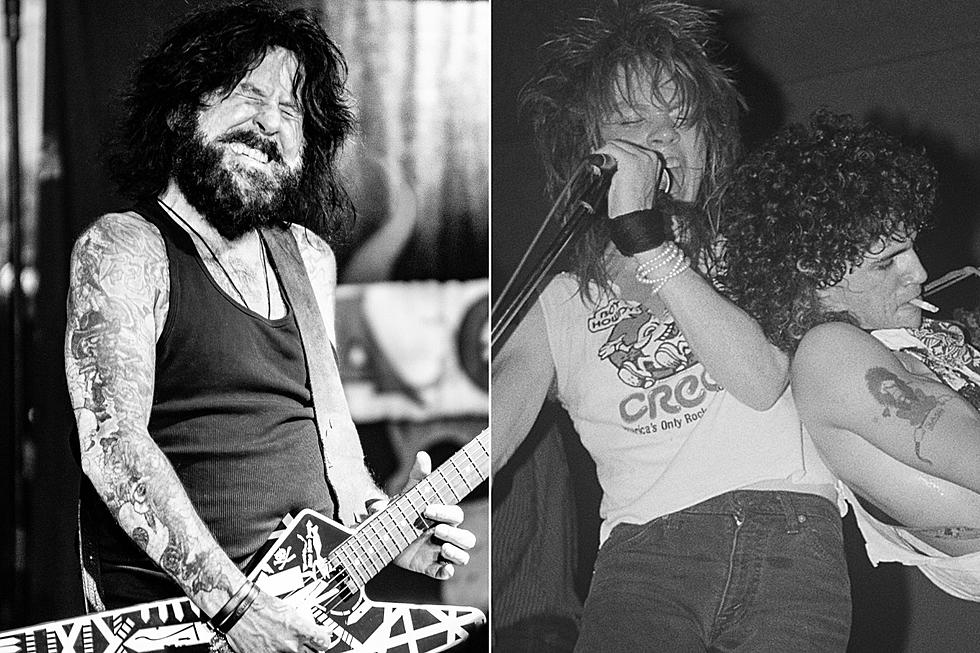
Tracii Guns Says It’s ‘Great’ That L.A. Guns Made New LP Remotely
Many bands balked at the prospect of having to record music remotely during the coronavirus pandemic. Tracii Guns relished it, boasting that he never saw his L.A. Guns bandmates in person while making their new album, Checkered Past, out Nov. 12.
The namesake guitarist began writing the songs for Checkered Past about a year and a half ago, sending the tracks to his bandmates — singer Phil Lewis, bassist Johnny Martin, rhythm guitarist Ace Von Johnson and drummer and engineer Adam Hamilton — to record their parts at home. Hamilton, who previously served as L.A. Guns' bassist and rhythm guitarist, played drums in place of touring drummer Scot Coogan, who Guns says couldn't perform on the album because he didn't have a home-recording setup. (Coogan has denied this, claiming the band didn't want to pay him his standard rate to book a studio and record drums.)
The result is a raw, raunchy album that harks back to L.A. Guns' late-'80s heyday, full of crunchy punk-metal ("Cannonball," "Better Than You"), anthemic riff-rock ("Bad Luck Charm," "Knock Me Down") and dark, brooding balladry ("Let You Down").
Ahead of the release of Checkered Past, Guns speaks to UCR about the album-recording process and his goals for every L.A. Guns release.
What goes into making a record amid the pandemic, logistically? What kind of challenges did you encounter?
In the end, there's no conversation. It's like, "Here's the music, do your thing," each guy. And then [cowriter] Mitch Davis works with Phil exclusively. So I never really get any rough vocal takes. It's kind of rough but almost done. So that really eliminates any chance of Phil and I arguing. So the process is really smooth. The band spends zero time in the same room, which is such a great thing. I mean, if the records turned out horrible, then I would say the opposite. I'd say, "Hey, guys, we really need to get in the room, we need preproduction, blah blah blah." But I think the benefit of experience and songwriting experience and the sort of team that does these records now, it's smooth and easy, and it gets done and they turn out great. The quality control is up to each guy when they're doing their part, and Adam ended up mixing this record, too. He's just so talented. It's hard to lose.
It sounds like you got the benefit of getting to be as perfect with your parts as you wanted to without the pressure of feeling like your bandmates are breathing down your back in the studio.
That's a real thing. And the other thing is trust with the people you work with. Sometimes you want to be in that situation together so you can monitor each other. And musicians tend to get lazy and go, "That's good enough," when it's not good enough, and "We'll fix it in the mix" kind of mentality. I just think I'm really lucky. I just think the people that are involved really have a lot of self-respect and [know] what they want to put on a timeless recording. And that's the thing that musicians should always realize, especially when they're self-recording, is that what you're sending back, that's around forever, until the Sun engulfs the Earth. Those audio recordings are around forever. So some alien guy 6 million years from now is gonna hear your recording by chance and go, "What the fuck was this guy thinking?" You don't want to leave it open for interpretation.
Listen to L.A. Guns' 'Cannonball'
It's entirely possible that this could be somebody's first L.A. Guns album that they ever hear.
Always. Of course. And it goes to the timeless question: Is this your best album to date? And it's gonna be to somebody. You know what I mean? Someone's gonna buy the record, and it's gonna be the first time engaging with the band, and it will end up being their favorite L.A. Guns record because it was their first record. I'm too guilty to slack, and it's the one area of my life I don't slack, and that's recording and writing and hitting the send button in the email.
Were there any songs that you would send out to the other guys that somebody was like, “Look, man, I'm really not feeling this track”? Or were the songs you sent out the ones that wound up on the record?
Yeah, that's it. I do the sorting before I send. Every now and then, I'll think I have some brilliant idea for a piece of music, and it's not. And you’ve got to know where that line is, and I don't cross that line. So every piece of music has to be special before I hit the send button. It has to be, like, I had an idea, here was the idea and the idea came to life, and it makes sense, and it's actually better than I thought it would be. That's always the criteria. L.A. Guns has always created music that way. The music's first, before we put Philip through the torture test. Because ultimately when you write this way, it's up to the singer to just destroy the song or make it a great song. They don't have the benefit of, "Hey, I put this song together, man, it's groovy, check out my chorus." It's not like that. There were times [when] we were younger where Phil's big line to me was, "I can't write over jazz, man." He would say that to me. And it's not jazz. Just listen to it enough times, and you'll see where the verse is.
The album's got a very live feel to it. It's got a good swing and a good groove, and the performances are tight but not mechanical.
Johnny and I, we've been with enough producers in our life to know to play behind the beat, which is a really important element in making a professional-sounding rock 'n' roll record. If the guitars and the bass get ahead of the drums, that's when people say, "That's a terrible record." They don't know why it's a terrible record, but that's one of the biggest elements. ... If the drummer really lays down an interesting track that really has feel — like, "Oh man, I don't want to put any music on this because I love this drum track so much, I just want to stare out the window and listen to drums” — that's inspiring. It's really inspiring to have drum tracks like that. And then you kind of just pretend the guitar is the big 64-box, 128-box of crayons, and you get to do all those kinds of things.
Listen to L.A. Guns' 'Knock Me Down'
Nothing about this album feels like a warm, fuzzy nostalgia trip, which, 30 years into your career, very easily could have happened. It sounds raw and urgent and raunchy. The first track, "Cannonball," gives me an Aerosmith "Jailbait" sort of feel, the way Phil is singing.
Yeah, I could see that. I think, also, the other one that's like that, kind of reminds me of "Bright Light Fright," is Ace's song, "Living Right Now." It really has this super cool Aerosmith Rocks thing about it. And I guess that just comes from the years of Aerosmith worship that we all partake in in this band. But that's the thing: I never, ever, ever, ever go into a record thinking, What do L.A. Guns fans require? I know what they want. They're L.A. Guns fans, and L.A. Guns should sound like L.A. Guns. But we've been really lucky in the fact that, starting from the first record, we established some diversity. So, by having, let's just say, "One Way Ticket" on the first record — which really isn't a ballad, it's more of a murder ballad or a suicide ballad or something — so, as the years have gone on, just adding a little bit more when possible really opens up the listener's mind to accept that the next record’s gonna be different than the previous record.
Every new record, the idea is like, What do I want to hear? What song didn't Zeppelin write that I can write? What song didn't Accept write? Whatever it is. And that's more where I draw fun and inspiration from: What would Keith Richards do here? What would Randy Rhoads do? What would John Bonham do here? What would Neil Peart do here? All those kinds of fun puzzle pieces constantly go through my mind when I'm writing the music. And I try to keep it from getting progressive, and I think we maintain that really well.
Watch UCR's Complete Interview With Tracii Guns




